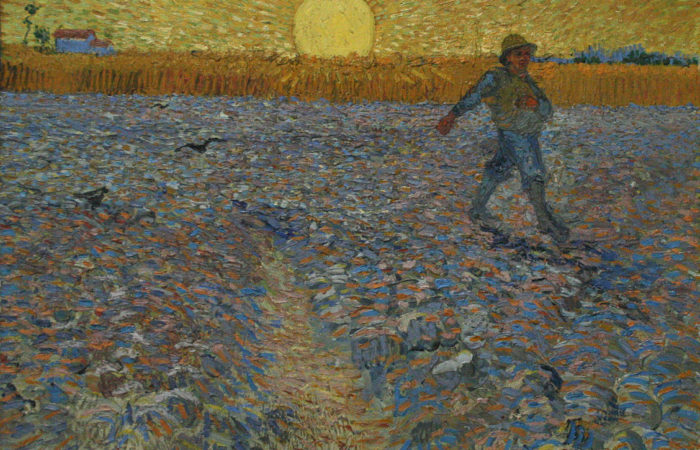
Prepare the Way for the Lord
The Gospel of Mark begins with a voice crying out, “Prepare the way for the Lord” (1:3). This voice is identified in verse 4 as John the Baptist. He was raised up by God in fulfillment of Isaiah 40:3-5. He was the one who cries out to Israel to get ready for the coming of the Lord. By calling the Jews to repent and by baptizing them as a sign of their repentance, John set the stage for the coming of Jesus and his announcement of God’s kingdom. Moreover, he pointed directly to the advent of one who would baptize, not with water, but with the Holy Spirit (1:8).
Read Article
Jesus is the King
I want to reflect further on the opening verse of Mark. In yesterday’s Life for Leaders devotion, I focused on the meaning of “good news” in the statement: “The beginning of the good news about Jesus the Messiah, the Son of God” (1:1). Today I want to draw our attention to the specific content of that good news as he opens his Gospel.
Read Article
Parable of the Sower: A Good Harvest
Today’s text describes the seed falling into good soil. So, what makes the soil good? As our last set of reflections suggested, part of the answer lies in our giving conscious, sustained and disciplined attention to Jesus’ way of life and leadership. However, this is not merely an exercise in acquiring leadership knowledge or technique. Jesus’ teaching challenges us at the core of our being as leaders.
Read Article
Holy Week and Work: Encountering God at Work
But today I want to focus on something rarely mentioned among commentators: the centurion encountered God in his work. It’s not particularly unusual for people to meet God in their work. This happens – and should happen – all the time. But what is so striking in the case of the centurion is the kind of work he was doing when he had his divine encounter.
Read Article
Marketplace Leaders Are Judged by Their Friends
Leaders are constantly tempted to focus on people higher up the food chain. Courting the influential and powerful seems like the best decision, since they are the ones who can provide the greatest benefit in return. Life’s funny, though, and it’s often the characters on the margins who end up changing our story the most. Growing up in the junkyard I knew a lot of . . . let’s call them “interesting” characters. So I can sorta understand Rahab, a resident of Jericho we read about in Joshua 2 and 6.
Read Article
Leaving a Legacy
I shared yesterday how Jesus could be perceived according to certain leadership standards as having failed numerous times… In a Nazarene synagogue, Jesus initially astonishes his hearers with his teaching ability. But that brief approval is quickly followed by criticism, rejection and… an attempt to kill Jesus! With this kind of response from his audience, I don’t think Jesus would have passed the modern test of “successful” preaching or leadership, would he?
Read Article
Revolutionary Communicator: Solitude
In Jedd Medefind and Erik Lokkesmoe’s book, The Revolutionary Communicator, they highlight the fact that Jesus made time for solitude amidst the incredible demands of his ministry. “Jesus, of course, was well aware his presence and words were in demand. This is precisely why he traded an hour or two of sleep for time alone. For Jesus, solitude and quiet, reflection and prayer, were lifeblood” (The Revolutionary Communicator, 118).
Read Article
God of the Ordinary: His Working Hands
Jesus ate, he slept, and here we see, he worked. And though the word we translate “carpenter” could have meant a broader range of things back then, we know Jesus worked humbly and diligently with his hands. He learned his trade, refined his skills, and worked the daily and ordinary grind, like many of us.
Read Article
Failing in Public
Through the years, I have learned that some of what we call “failure” is really just growth, or transition, or a lesson being learned. It is the act of discovering something new about ourselves and the world, or entering in to a new season, or becoming more fully alive.
Read Article
Asking Good Questions and Living a Compelling Life
Jesus had a way of using questions to help people see better… Leaders become good at asking questions that help others see barriers in their lives and in their world. But leaders more importantly need to live a compelling life that forces people to ask the right kinds of questions, challenging assumptions and leading people to make choices for a better life revolving around Christ.
Read Article
Revolutionary Communicator: Asking Questions
When a blind beggar cries out to Jesus for mercy, Jesus decides to ask the man what he wants. Isn’t it obvious? A blind beggar obviously needs to be healed! But Jesus respects the man by not assuming, but instead asking an empowering question that allows for the one in need to express his desire. Just this one observation of Jesus’s leadership speaks volumes to how we should engage with those we serve.
Read Article
Focusing on a Few
When you focus on a few, there are going to be some who are disappointed that they weren’t chosen. But good leadership isn’t driven by pleasing people… If we study Jesus’s leadership, we will see that his investment in a few key people was a core strategy for his short three-year ministry.
Read Article
Disappointing Your Followers
Why does [Jesus] leave when there is so much momentum in Capernaum? At the very start of Jesus’s ministry, he is disappointing followers by not doing what they want and not meeting legitimate needs… Apparently the greatest leader to ever walk planet Earth understood that fulfilling his calling perfectly would leave many people disappointed.
Read Article
The Fourteenth Station: Jesus is Placed in the Tomb
In most human societies appropriate burial of dead bodies is a sacred tradition. It matters profoundly that we ensure the proper resting place for those who have died. Yet, after burials happen, we don’t generally mention them specifically.
Read Article
The Seventh Station: Jesus Takes Up His Cross
Jesus had said this would happen. For quite some time he had predicted his suffering and death.
In the final events of his life, Jesus seemed to be orchestrating events that might otherwise have been out of his control.
So, though the crucifixion of Jesus is horrendous from one point of view, it is also wondrous from another perspective.
Read Article